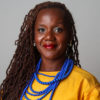On Friday, March 22nd, the Africana Studies Program hosted their 4th bell hooks symposium on the Oakland campus. This symposium, “The Black Feminist Classroom: Education as the Practice of Freedom,” marked the first time that this event was held elsewhere within Northeastern University’s global network. The program featured a keynote conversation between Angela Davis and Gina Dent, a roundtable of panelists from Oakland, and a workshop led by Northeastern Professor and author Patricia Powell. Throughout the day, guests reflected on what it means to espouse Black feminist principles in education and learning, both inside of and outside traditional academic settings. These conversations were inspired by bell hooks’ groundbreaking book, Teaching to Transgress: Education as the Practice of Freedom.

The day began with land acknowledgement as M. Zamora and Ife Tayo Walker guided attendees through these sacred rites intended to honor and educate. Ashley Adams offered a warm welcome and introduced Régine Jean-Charles, Director of the Africana Studies Program, who has been organizing similar symposia at Northeastern since 2021. Professor Jean-Charles explained that “the idea of The Black Feminist Classroom: Education as the Practice of Freedom takes seriously Farah Griffin’s point that ‘Black feminism has never only been about Black women, it’s never been this. It’s been about a more just world. And a planet that said if you listen to the insights of the least of these, which is us, that we can do something transformative.’” As Darcelle Lahr notes, this theme is especially important because, “By continuing to center the voices and experiences of marginalized groups, and those who have persevered so tirelessly before us, we can create a future where education truly becomes a practice of freedom, for all.”

The keynote conversation, “Teaching to Transgress,” was moderated by Oakland resident and founder of Change Consulting Bilen Mesfin Packwood, introduced by Carrie Maultsby-Lute, Head of Partnerships at Northeastern’s Oakland campus. Angela Davis and Gina Dent, activists, scholars at UC Santa Cruz, and authors, shared how Black feminist education has played a role in their lives, as students, educators, and activists. Professor Davis noted what it was like to “know bell hooks before she became bell hooks” and praised how the trailblazing intellectual “popularized thinking [and] encouraged people to think deeply.” Both Davis and Dent emphasized the fact that “education happens everywhere” and that “education has always been at the heart of the quest for freedom.” Throughout this thoughtful conversation they broached topics such as collective work, building an abolitionist community, challenging the normative structure of education, embracing differences, and having a global perspective for Black feminist activism.
“We are often not always clear about what we mean by education. Education involves critical thinking and being able to ask questions about everything in our lives.”
Angela Davis
Lunch featured a conversation with CSSH Dean Kellee Tsai and Vice President of Advancement Jennifer Barrymore. They drew from their personal experience as women of color in the academy in a discussion on championing diversity and inclusion throughout the Northeastern network. The roundtable discussion, “Education as the Practice of Freedom,” was moderated by Nneka Allen Harrison and included Carlita Ballard, Patrice Collins, Rowena Brown, Karimah Omer, and Brandi Thompson Summers. Their wide-ranging conversation offered insights about teaching, learning, parenting, research, activism, and governance. Recalling the roundtable and the work leading up to it, Professor Nneka Allen-Harrison shared that, “The conversation was collaborative, and the perspectives offered were relevant to people from all facets of society. I received texts and emails from friends, family, students, and colleagues who expressed gratitude for how the discussion made them feel refreshed and reflective about their own practice.”

The day concluded with a workshop led by Patricia Powell, titled “A Love Ritual for bell.” She inspired the audience to reflect on the concepts of love and collectivity that bell hooks preached in her writing. This contemplative experience allowed the audience to connect with each other and bell hooks through an almost meditative process. Professor Powell ended by asking each participant to give an offering to bell hooks in honor of her legacy. In her closing remarks, Darcelle Lahr reminded us that “Through our commitment to justice-based teaching practices, critical engagement with history, and fostering diverse and empowering learning environments, we are constantly striving to embody bell hooks’ vision of education as a vehicle for transformative change.” With this stirring conclusion, attendees were left with the lasting impression that it is possible to honor bell hooks by practicing Black feminism within and outside of the classroom.

Overall, it was an impactful and heartfelt day that allowed for colleagues and students from Oakland and Boston to collaborate and connect. As Darcelle Lahr noted in her reflection, the work to continue the legacy of bell hooks extends far beyond a one-day symposium and must continue throughout the network. “By acknowledging historical injustices, by purposefully enriching our curriculum, promoting faculty diversity and equity, engaging with our local community, and determinedly introducing restorative practices, we are actively working to create a more equitable and just learning environment for our community…bell hooks emphasizes the need to build a community of learners in the classroom, to foster open communication, and to create a space where personal narratives can be shared. Creating this type of space for healing and reconciliation is core to our reparations work, and to our teaching.”
*Professor Jean-Charles would like to give special thanks to all of the participants as well as Ron Sandler, Kellee Tsai, Beth Kochly, and Christie Chung and Serena Turner, Jenia Browne, Asia Potts, and Taliyah Williams for this event write-up. All photos are courtesy of Jay Gash.










